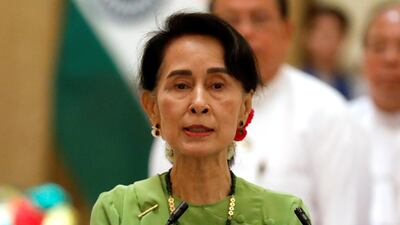Global outrage over Myanmar's treatment of its Rohingya Muslims is being fuelled by "a huge iceberg of misinformation", Aung San Suu Kyi said on Wednesday, after the UN led calls for her government to end violence that has forced 146,000 to flee to Bangladesh.
Rohingya refugees have poured over the border with Bangladesh, fleeing a massive security sweep in western Rakhine state by Myanmar forces following a series of deadly ambushes by Rohingya militants on August 25.
Ms Suu Kyi's government has faced growing international condemnation for the army's response with refugees bringing with them renewed stories of murder, rape and burnt villages at the hands of soldiers.
But in her first public comments since last month's ambushes, she said sympathy for the Rohingya was being generated by "a huge iceberg of misinformation calculated to create a lot of problems between different communities and with the aim of promoting the interest of the terrorists".
The comments were made in a statement put out by her office following a call with Turkey's president Recep Tayyip Erdogan, who has been particularly critical of Myanmar's treatment of the Rohingya, dubbing it a "genocide".
_____________
Read more:
Suu Kyi faces increasing international pressure to address Rohingya crisis
It really is time to stop making excuses for Aung San Suu Kyi over the Rohingya
_____________
But Ms Suu Kyi defended her government's actions saying her administration was "defending all the people" in Rakhine state.
The statement highlighted a now deleted tweet last week by Turkey's deputy prime minister Mehmet Simsek showing a series of gruesome pictures of bodies he wrongly claimed were of dead Rohingya.
Supporters of both the Rohingya and Myanmar's government have a track record of posting emotive images that are not from the conflict.
Myanmar's Rohingya are the world's largest stateless minority and have lived under apartheid-like restrictions on their movement and citizenship for years.
They largely eschewed violence, but in October a new militant group called the Arakan Rohingya Salvation Army launched a series of deadly ambushes on border police prompting a massive army-led crackdown.
More than 200,000 Rohingya have fled to Bangladesh since October.
That includes 146,000 in the last two weeks, piling huge pressure on an impoverished neighbour that already hosted 400,000 Rohingya who had fled Myanmar over the past four decades.
"The number is growing every day," UNHCR spokeswoman Vivian Tan, told AFP. "It's a growing humanitarian crisis."
Editorial: The violence against the Rohingya is a crime against humanity
An AFP reporter on Tuesday witnessed scores of new refugees wading through neck-deep water as they crossed the river Naf into Bangladesh after lengthy jungle treks.
"I walked seven days with my family members, carrying my 90-year-old mother on my back," exhausted refugee Ali Ahammad, 38, told AFP.
Gul Bahar, a mother of six, said she had traded her wedding jewellery with a boatman.
"We safely arrived by Allah's will but now we're nothing but penniless refugees," she said.
Moral force?
The latest violence has also hit Rakhine's Buddhist and Hindu populations with nearly 27,000 people displaced and fleeing in the opposite direction and some saying Rohingya militants had murdered their kin.
UNICEF said 80 per cent of the refugees coming into Bangladesh were women and children placing a huge burden on the country's overstretched refugee camps.
Aid agencies have also had to end food distribution in northern Rakhine because of the fighting. UNICEF said it was currently unable to reach some 4,000 children in the Rakhine towns of Maungdaw and Buthidaung it was previously treating for malnutrition.
Ms Suu Kyi, a Nobel Peace Prize winner who spent years under house arrest when Myanmar was under military rule, has come under intense pressure over her refusal to speak out against the treatment of the Rohingya or rein in the army.
Public anger is particularly acute in Muslim countries. Thousands protested in Jakarta on Wednesday outside the Myanmar embassy.
"I think this is not only a religion issue, but moreover a humanitarian issue. What is happening there is very cruel," Tita Fatmawati, a teacher from nearby Bogor, told AFP.
Police in Jakarta have previously stopped two attempts by militants to bomb Myanmar's embassy.
Read more: Rohingya crisis: Malala Yousafzai calls for Aung San Suu Kyi to condemn violence in Myanmar
Analysts say Ms Suu Kyi's obduracy despite the years of pressure from rights groups is a sop to the powerful army and surging Buddhist nationalism in the Southeast Asian country.
The Rohingya are widely dismissed in Myanmar as illegal immigrants from Bangladesh despite many tracing their lineage back generations.
They are not formally recognised as an ethnic group and are derided by many in Myanmar as "Bengalis" — making supporting them hugely unpopular.
She also has little control over the army, which has a long track record of rights abuses and using overwhelming force against domestic insurgencies.
But detractors say Ms Suu Kyi is one of the few people with the mass appeal and moral authority to swim against the tide on the issue, adding she has routinely defended the military's response.
Earlier this year, UN investigators said Myanmar's military has used "devastating cruelty" in its security crackdown in what might constitute ethnic cleansing of the Rohingya.
Ms Suu Kyi's government has dismissed those allegations and has refused to grant visas to UN officials charged with investigating reports of atrocities.

